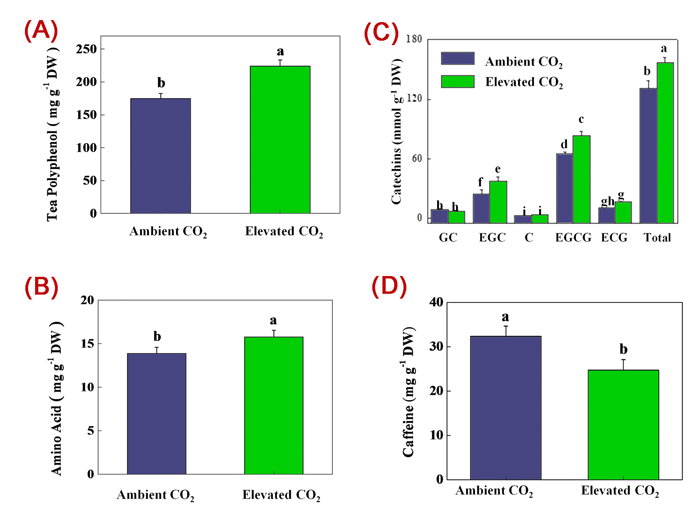| Tweet | Follow @co2science |
Paper Reviewed
Li, X., Zhang, L., Ahammed, G.J., Li, Z.-X., Wei, J.-P., Shen, C., Yan, P., Zhang, L.-P. and Han, W.-Y. 2017. Stimulation in primary and secondary metabolism by elevated carbon dioxide alters green tea quality in Camellia sinensis L. Scientific Reports 7: 7937, DOI:10.1038/s41598-017-08465-1.
The tea plant (Camellia sinensis) is a small evergreen shrub cultivated for the production of tea. Green tea is one form of drink that is derived from two leaves and a bud of C. sinensis. It is consumed around the world for its pleasant taste and health benefits, which are predominately derived from two groups of chemicals: polyphenols (in particular, catechins) and amino acids (chiefly theanine). Known health benefits of green tea include chemicals that help prevent cancer and other cardiovascular and neurodegenerative diseases, reduce high blood pressure, improve relaxation and inhibit the side effects of caffeine.
Despite the aforementioned benefits of C. sinensis, authors Li et al. (2017) report that the effect of elevated CO2 on the growth of tea plants and their production of primary and secondary metabolites linked to tea quality has not yet been examined, an omission they set out to rectify. More specifically, the team of nine Chinese scientists grew tea plants in controlled environment chambers for a period of 24 days under ambient (380 ppm) or elevated (800 ppm) concentrations of atmospheric CO2, during which time they measured a number of primary metabolic processes related to photosynthesis and growth. In addition, they analyzed the concentrations of various polyphenols and amino acids to determine the impact of CO2 enrichment on tea quality.
And what did their analyses reveal?
Li et al. report that elevated CO2 stimulated net photosynthesis by 142, 122, 137 and 88 percent on days 6, 12, 18 and 24 of the study, respectively. Growth and biomass accumulation also benefited from higher levels of CO2. At the end of the experiment, for example, plant height and leaf, stem, shoot and root dry weights in the CO2-enriched chambers were 14, 46, 25, 34 and 68 percent higher, respectively, than their ambient counterparts. In addition, elevated CO2 increased the concentration of sugar, sucrose and starch in tea plant leaves.
With respect to tea quality attributes, the scientists determined that elevated CO2 increased tea polyphenol, catechins, and amino acid concentrations by 28, 21 and 13 percent, respectively, while it decreased caffeine concentration by 24 percent (see figure below). Such observations, in the words of the authors, are to be considered "a sign of good quality."
In further commenting on their several findings, Li et al. say their results indicate that rising CO2 "not only improves primary metabolism, but also promotes secondary metabolism towards production of a quality green tea." In the future, therefore, increasing levels of atmospheric CO2 will (1) stimulate the growth and development of C. sinensis, (2) enhance the production of health-benefiting substances in its leaves and (3) restrict a well-known health-harming one (caffeine).

Figure 1. Changes in polyphenol (Panel A), amino acid (Panel B), catechin (Panel C) and caffeine (Panel D) concentrations in leaves of tea seedlings grown at ambient (380 ppm) or elevated CO2 concentrations (800 ppm). Leaf samples were harvested after exposure of tea plants to different concentrations of atmospheric CO2 for 24 days. Data are the means of four replicates (± SD). Means denoted by different letters indicate significant differences between the treatments (P < 0.05). Source: Li et al. (2017).




